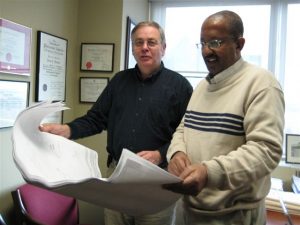 Since the establishment of MISA’s Employment Services Unit in 1998, staff have recognized that clients in regulated occupations face special difficulties. For internationally educated pharmacists, lawyers, architects, physicians, social workers and myriad others, the requirement to become licensed or certified is an enormous challenge. Our excellent pre-employment programs & services were not going to be enough for clients in regulated fields. We had to become agents of change and it didn’t take long to realize that we would need to work in partnership with all key stakeholders in an occupation. That meant not only regulatory authorities, but professional associations, education, government, employers, unions and sector councils. Our clients also needed a voice at the table.
Since the establishment of MISA’s Employment Services Unit in 1998, staff have recognized that clients in regulated occupations face special difficulties. For internationally educated pharmacists, lawyers, architects, physicians, social workers and myriad others, the requirement to become licensed or certified is an enormous challenge. Our excellent pre-employment programs & services were not going to be enough for clients in regulated fields. We had to become agents of change and it didn’t take long to realize that we would need to work in partnership with all key stakeholders in an occupation. That meant not only regulatory authorities, but professional associations, education, government, employers, unions and sector councils. Our clients also needed a voice at the table.
The first Multi-stakeholder Work Groups were organized in 2005 in engineering, medicine and nursing and brought key stakeholders together in profession-specific forums. With everyone at the table, the stage was set for serious discussion and the development of realistic sustainable solutions. Pathways to licensure were reviewed, unnecessary barriers removed, ideas incubated, opportunities for collaboration explored, and partnership programs developed, implemented and evaluated. There have been substantive accomplishments – the IMG Clerkship, process changes in Pharmacy, Workplace-based Assessment for Engineers, Observerships for Lawyers, to name just a few – but perhaps the most important function of these multi-stakeholder work groups is that they sustain the momentum for change.
Leading the Way
 Today this project has a life of its own. With the introduction of the Fair Registration Practices Act in 2009, the Province made a clear commitment to international qualifications recognition. In 2011, from working off the corner of her desk, Jan Sheppard Kutcher was invited to devote full-time leadership to the multi-stakeholder work group project and it has flourished.
Today this project has a life of its own. With the introduction of the Fair Registration Practices Act in 2009, the Province made a clear commitment to international qualifications recognition. In 2011, from working off the corner of her desk, Jan Sheppard Kutcher was invited to devote full-time leadership to the multi-stakeholder work group project and it has flourished.
There are currently twelve multi-stakeholder work groups encompassing 19 regulated occupations. These include Architecture, Dietetics, Engineering, Pharmacy, Medical Lab Technology, Nursing, Medicine, Law, Teaching, Social Work, Dentistry Professions and the Construction Electricians Trade. Jan co-chairs each of them along with a high profile member of that occupation. The project is funded by the Nova Scotia Department of Labour & Advanced Education with whom Jan works in close partnership while remaining on staff at ISANS. The project belongs to ISANS and continues to be driven by the needs of our clients.
Unique to Nova Scotia, this collaborative model is considered a best practice across the country. National organizations participate on the work group as members or to present and update on Pan-Canadian activities. Consultation has been provided to other provinces keen to replicate this model which exemplifies our organizational values of innovation and collaboration.
